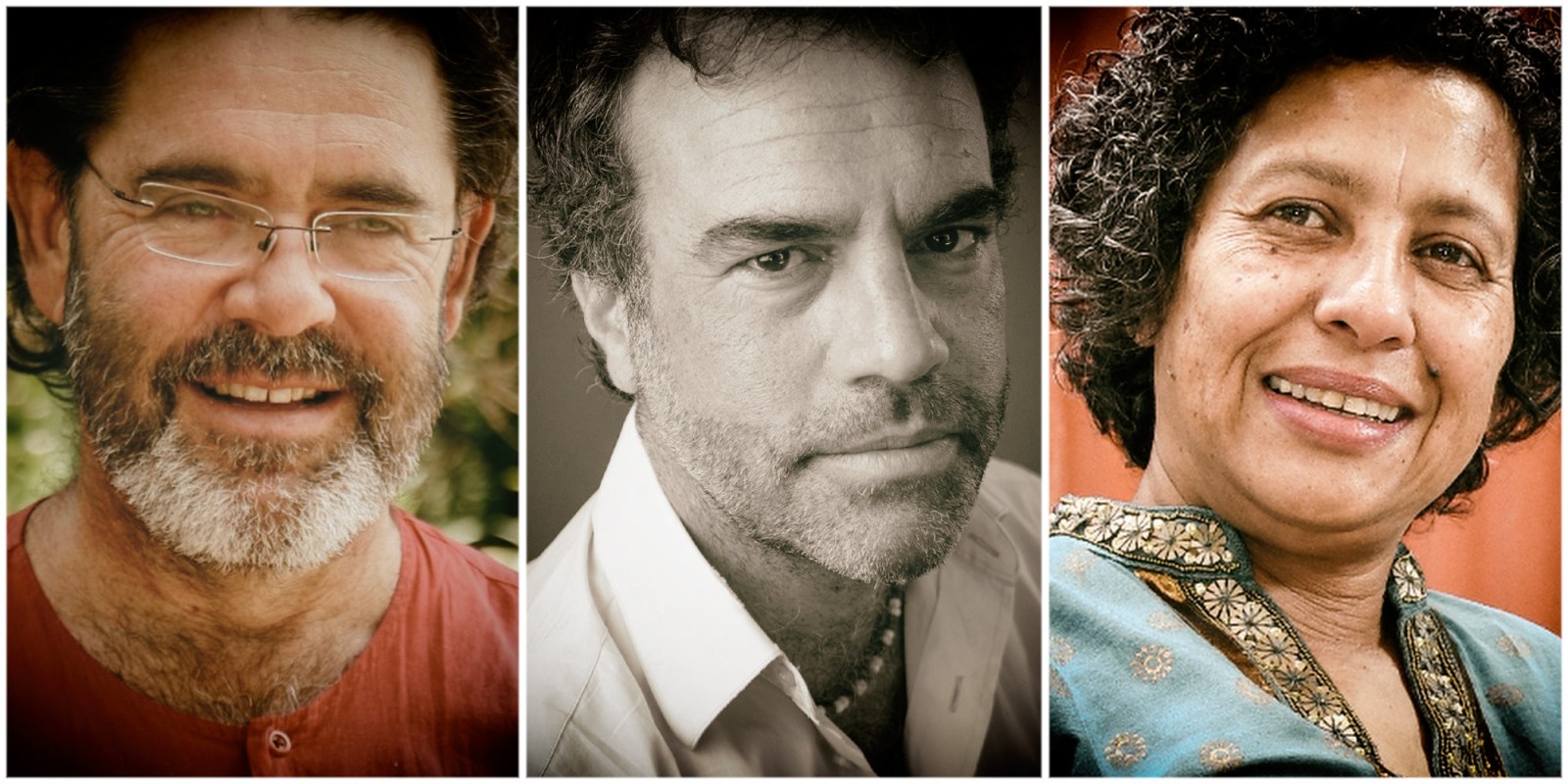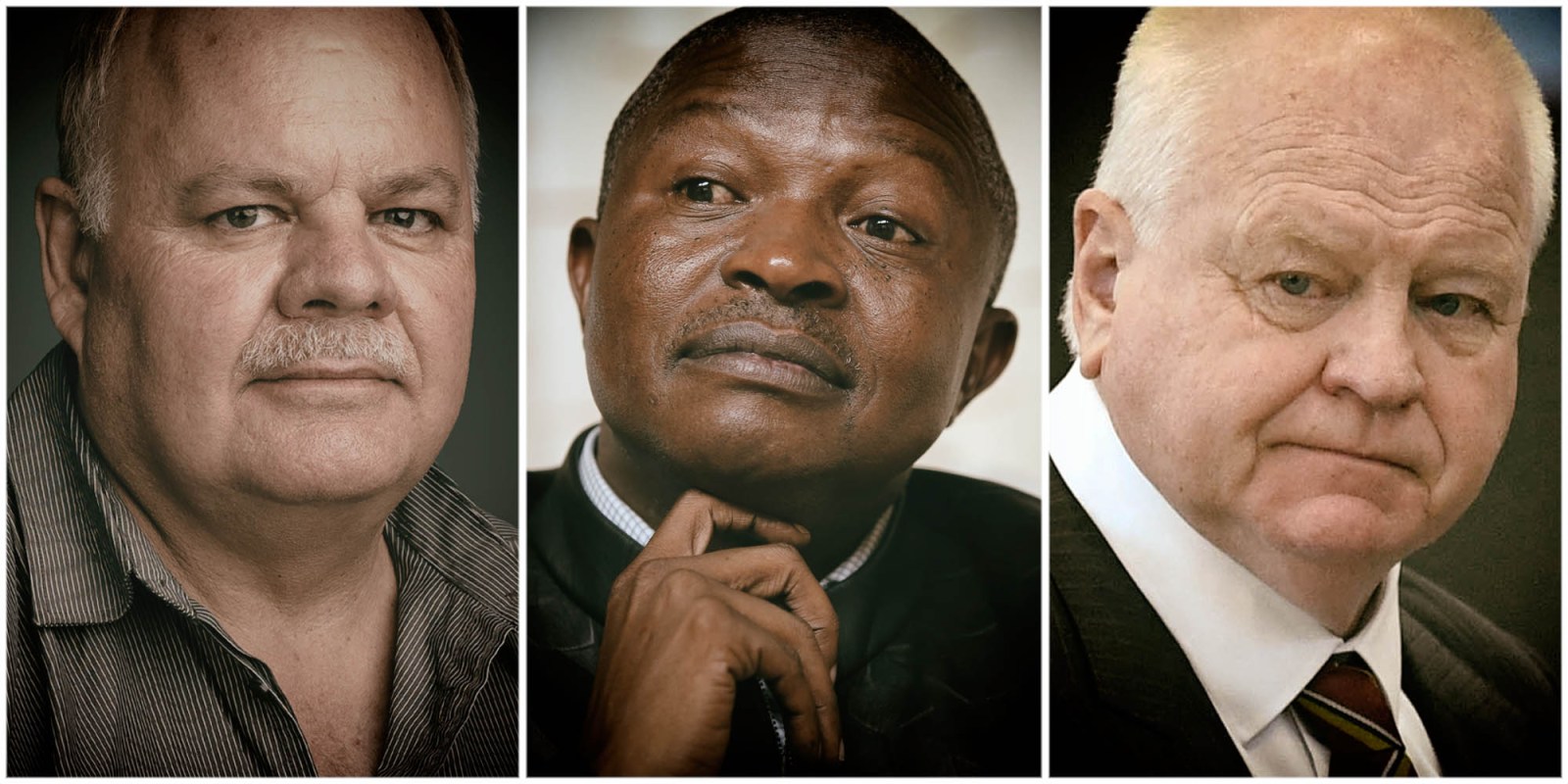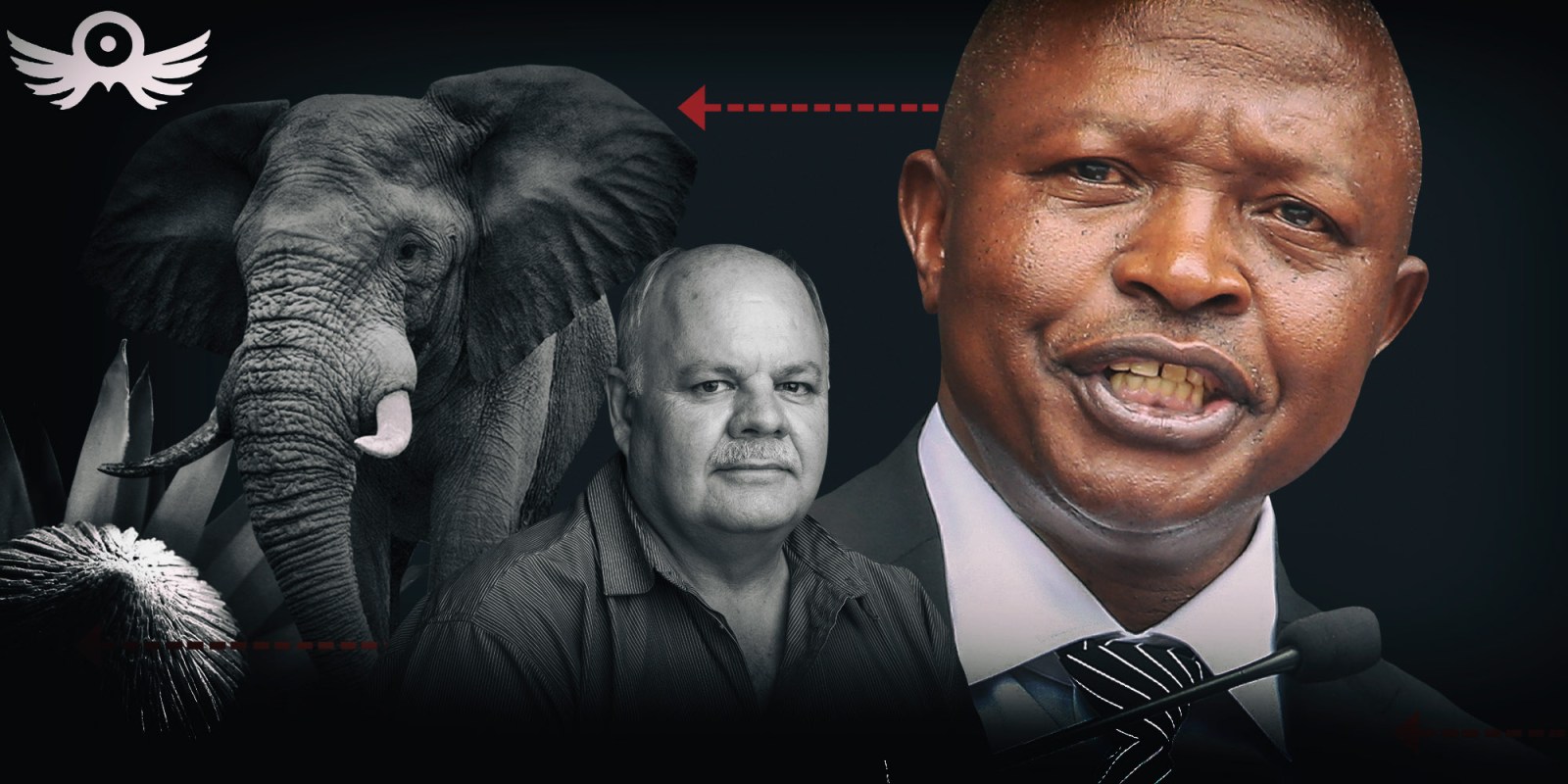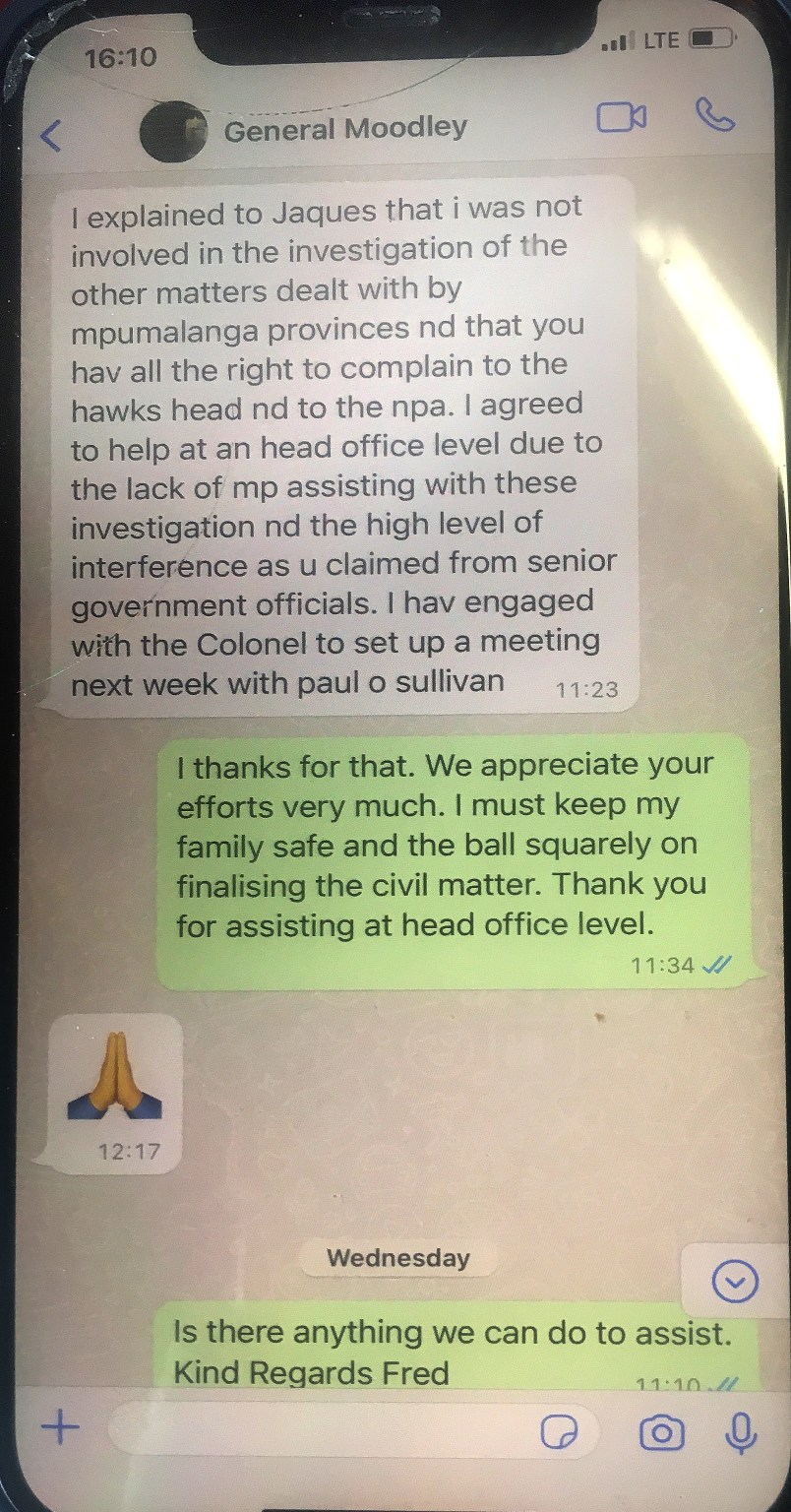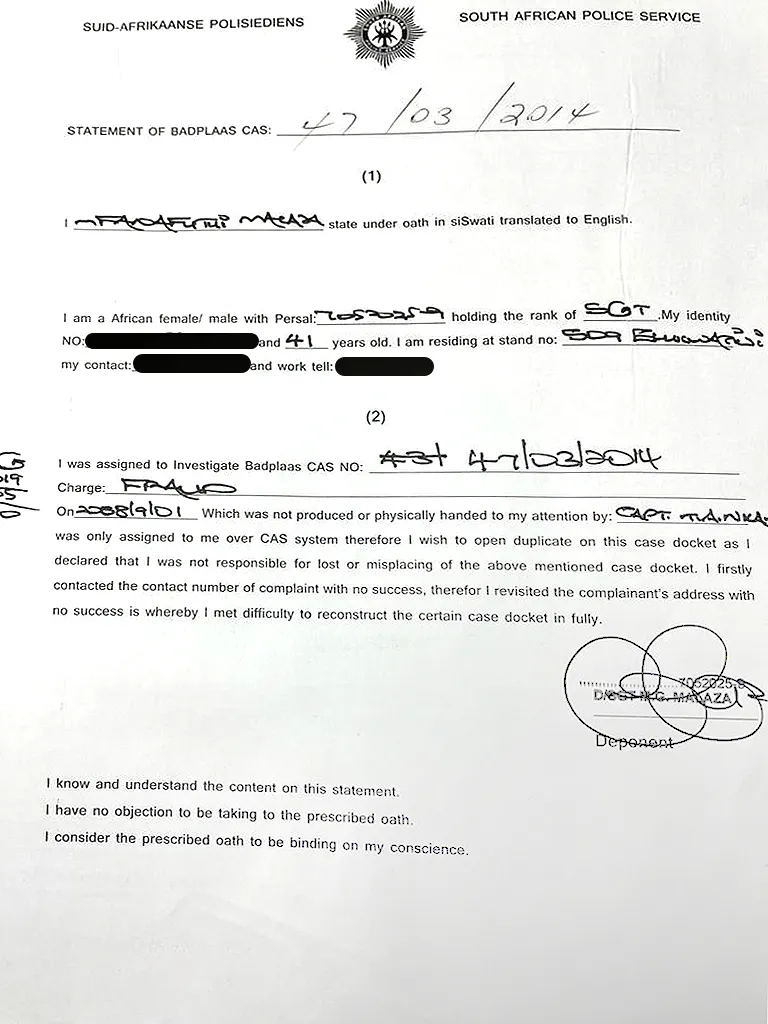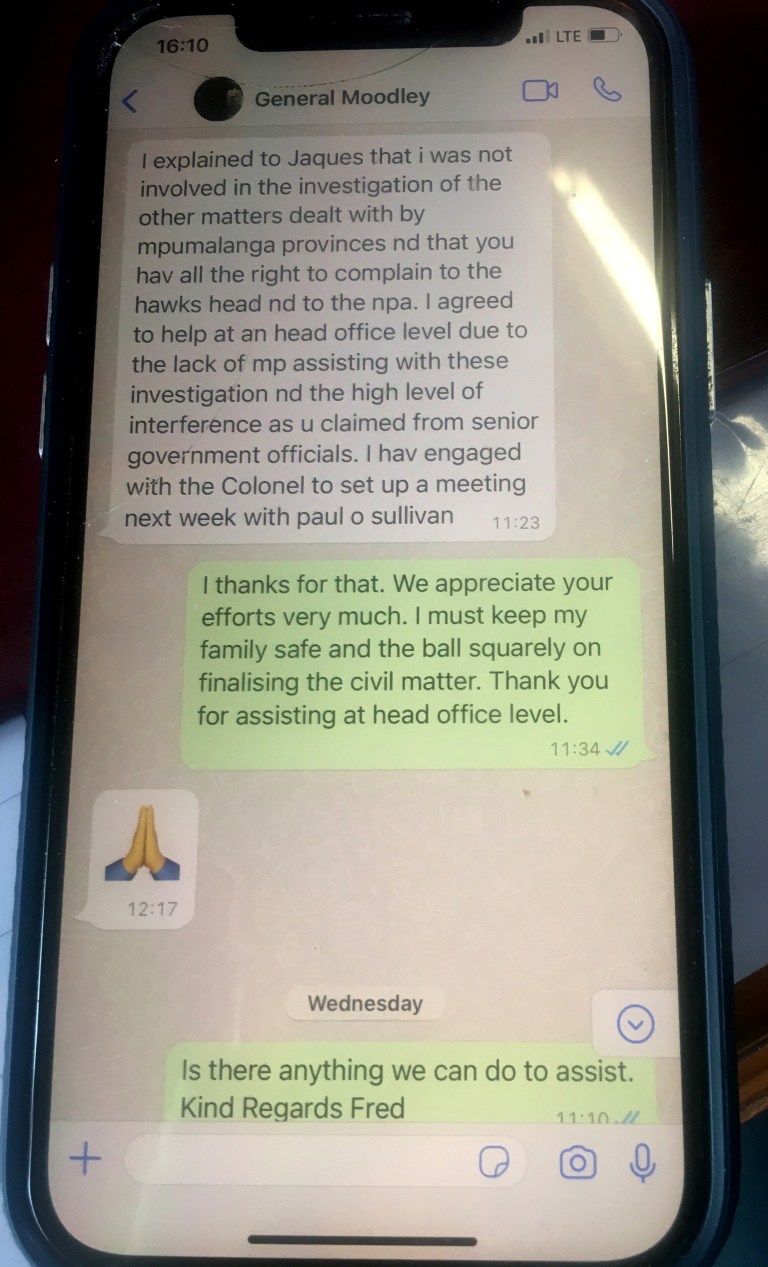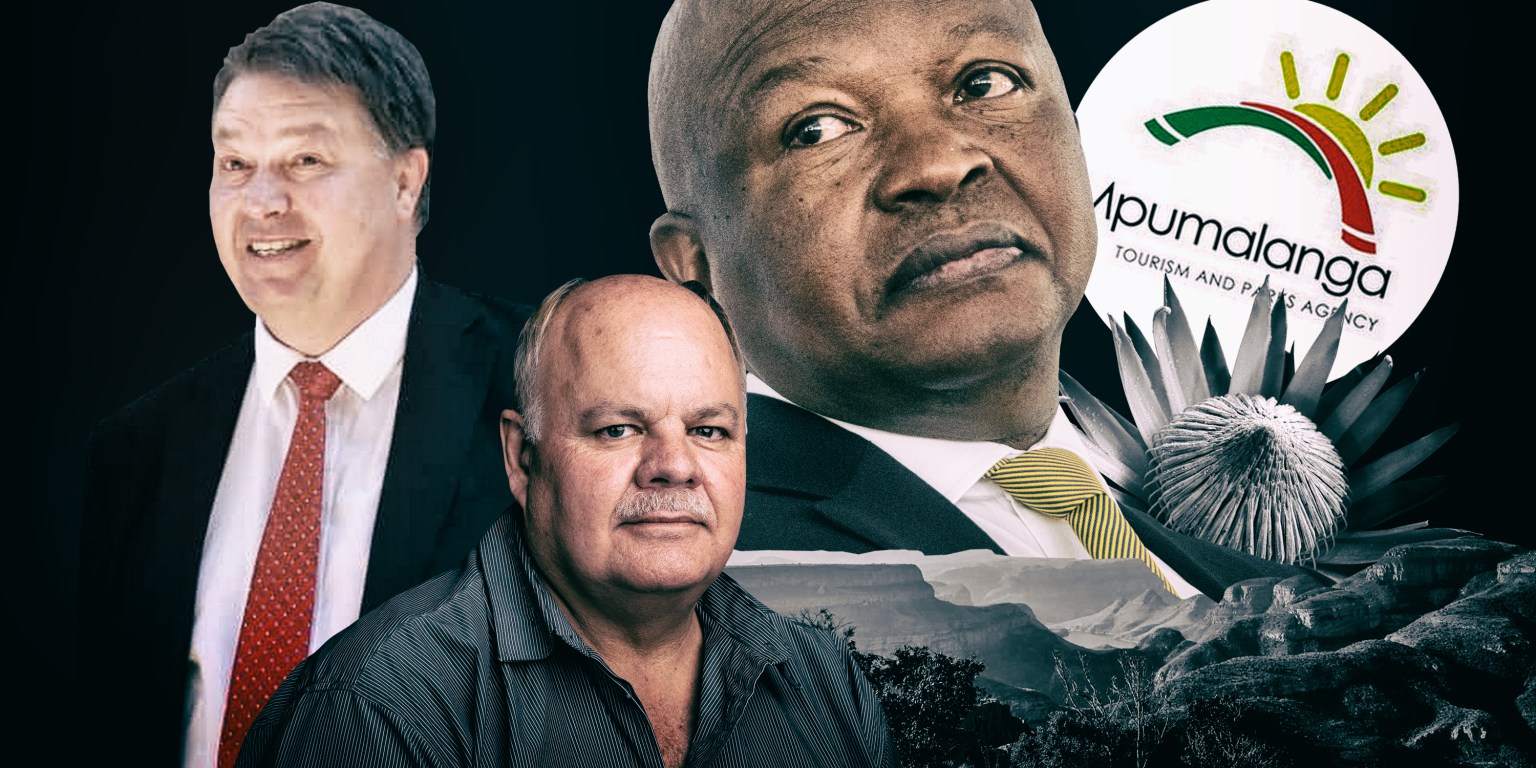‘Land scam kingpin’ – Deputy President David Mabuza named as top suspect in organised crime complaint
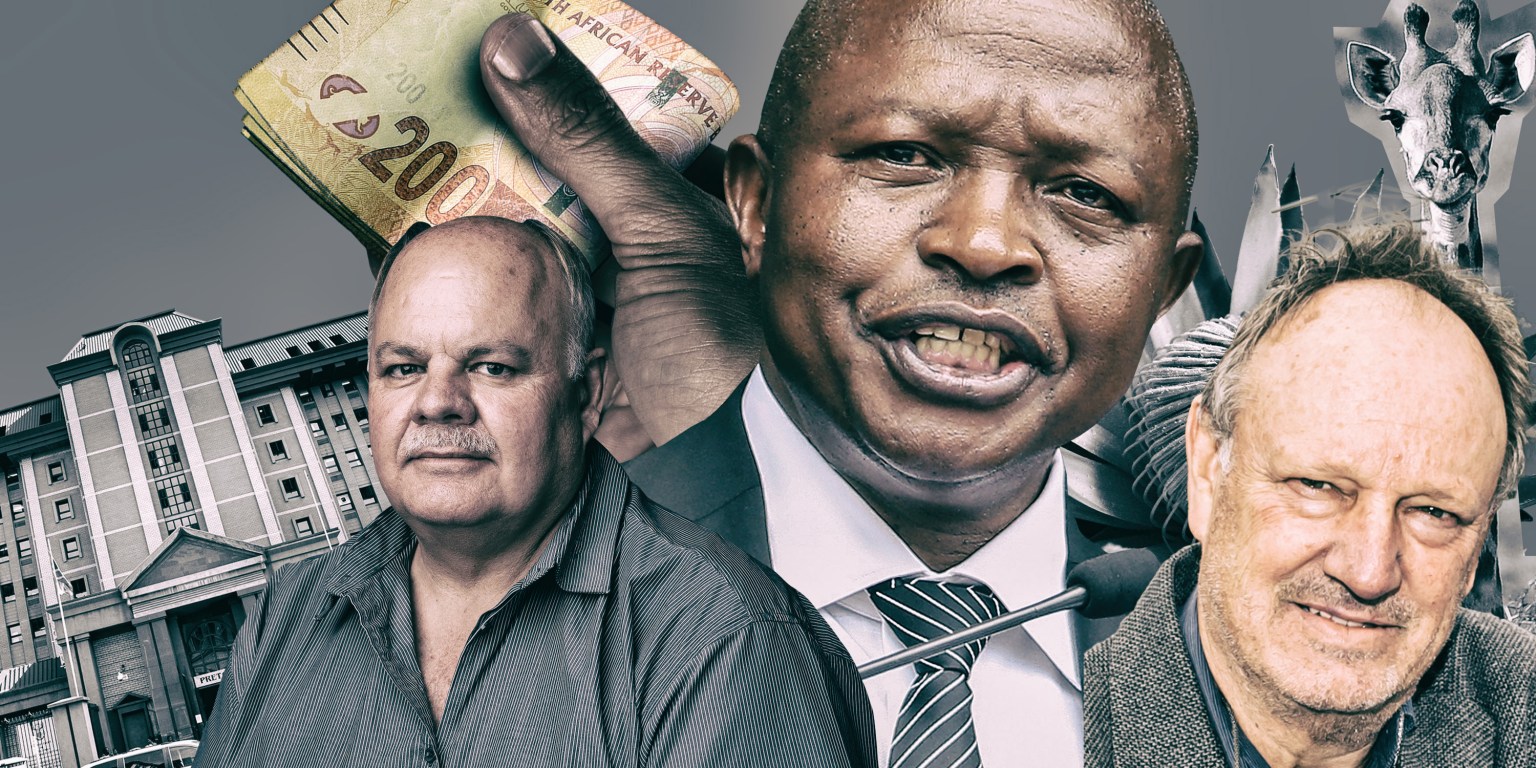 Illustrative image | Sources: Deputy President David Mabuza. (Photo: J Countess / Getty Images) | Fred Daniel. (Photo: Supplied) | GroundUp / Ashraf Hendricks | Twitter|Wayne Duvenage, CEO of Organistaion Undoing Tax Abuse (OUTA) (Photo by Gallo Images/Rapport/Deon Raath)
By Kevin Bloom | 05 Dec 2022
Illustrative image | Sources: Deputy President David Mabuza. (Photo: J Countess / Getty Images) | Fred Daniel. (Photo: Supplied) | GroundUp / Ashraf Hendricks | Twitter|Wayne Duvenage, CEO of Organistaion Undoing Tax Abuse (OUTA) (Photo by Gallo Images/Rapport/Deon Raath)
By Kevin Bloom | 05 Dec 2022
On the morning of 5 December 2022, the Investigating Directorate of the NPA received a criminal complaint from the Organisation Undoing Tax Abuse under the Prevention of Organised Crime Act, with Deputy President DD Mabuza named as the lead suspect. The allegations cover a litany of charges that stretch from 2002 to the present day, mainly to do with the ‘land claims scam’ and the case of conservationist and whistle-blower Fred Daniel. For the first time, all aspects of the case are submitted in a single affidavit, including the contents of the “missing dockets” as reported by Daily Maverick in August 2022. “Hotlinks” to the attendant evidence are also included in the complaint.
_____________________________________________________________________________________________________________
The top line
“We propose that the suspects referred to in the paragraphs below be charged under the umbrella offence of contravening Section 2(1)(d) of the Prevention of Organised Crime Act 121 of 1988 (POCA) in that they acquired or maintained, directly or indirectly, any interest in or control of the following criminal enterprises.”
The implication of this sentence, which introduces the criminal complaint submitted by the Organisation Undoing Tax Abuse (Outa) to the Investigating Directorate of the National Prosecuting Authority (NPA), may very well be that Deputy President DD “The Cat” Mabuza has run out of lives.
Lodged on the morning of 5 December 2022, the affidavit places Mabuza at the top of a list of 15 suspects, all of whom were allegedly involved in a pair of interlinked criminal enterprises that – according to a 2015 report compiled by retired judge Willem Heath – cost the South African economy in excess of R35-billion.
Among the specific crimes listed under the umbrella of POCA are: defeating the ends of justice, theft, fraud, perjury, contempt of court, intimidation, extortion and “conspiracy, incitement or attempt to commit any offence referred to in Schedule 1 of POCA.”
EVIDENCE OF CRIMINAL COMPLAINT
The affidavit incorporates an intricate web of allegations that stretch back to 2002, two years before the so-called land claims scam was exposed in the South African press. Significantly, it relies for the most part on oral and documentary evidence already submitted to the Pretoria High Court, where conservationist Fred Daniel has been waging a 12-year battle against Mabuza and the South African government.
Daniel’s R1-billion civil action, covered at length by Daily Maverick – the only media organisation in the country that successfully applied, via its lawyers, for access to the trial – has also seen the admission to the court record of a number of expert reports, which have been included in the criminal complaint as corroborating evidence.
At the same time, the complaint refers to a matter in which Daily Maverick’s reporting has been implicated. In March 2022, we published an investigative feature that tracked a reportedly “pivotal” aspect of the scam, from a hijacked community trust to fake letters of credit and the likely involvement of Pam Golding Properties. The endpoint of Daily Maverick’s reporting was the alleged complicity of Mabuza’s wife, Nonhlanhla Patience Mnisi.
On the back of Daily Maverick’s exposé, in early winter 2022, an investigation was launched by the head of the Serious Corruption Offences unit of the Hawks, Major-General Kubandran Moodley. But the investigation ran out of steam, we reported, when it was discovered that three prior criminal dockets – which covered the same allegations as those highlighted in our original piece – had inexplicably “been emptied” or “gone missing”.
In paragraph 8 of the criminal complaint, Outa refers to this latter “explosive article”, as well as to a further three dockets that were likewise tampered with. In the complaint’s conclusion, paragraph 266 states: “The proverbial smoking gun is the removal of evidence from the dockets and the squashing of altogether 6 criminal cases pertaining to the criminal enterprises.”
For the first time, then, Outa consolidates the full list of allegations, including the contents of the missing dockets, into a single affidavit. Certain events that have so far not been tested in the Pretoria High Court, such as an alleged pre-planned assault watched over by a “smirking” Mabuza on a member of Daniel’s team, have also been listed.
By Daily Maverick’s reckoning, although the case remains unavoidably complex, the 41-page affidavit presents the evidence in the most concise and watertight manner possible. It leads the prosecutors, headed by Andrea Johnson of the Investigating Directorate – who, in her own words, is “committed to bringing impactful cases to court in the fight against corruption” – methodically through the litany of allegations, beginning about two decades back and ending in the present.
The land restitution scam
To start, Outa divides the complaint into two interlinked criminal enterprises: a “land restitution scam” and a “Problem Animal Fund enterprise”. The former, explains Outa, is essentially about “obtaining beneficial control of vast tracts of land (sometimes fraudulently) and selling the land at inflated prices to the land claims commission”, while the latter is about “generating income by killing wildlife and aiding and abetting the land restitution scam”.
These enterprises, as Outa alleges, “acting in concert and in common purpose”, came into conflict with private sector tourism and conservation, and “in particular” they targeted Daniel’s “Cradle of Life Project” in Mpumalanga.
Kicking off with the land restitution scam, Outa cites the Restitution of Land Rights Act and Section 25(7) of the Constitution – specifically, the provision that “precludes someone dispossessed of rights in land before 19 June 1913 from claiming the restitution of land or equitable redress of those rights” – to demonstrate how a significant number of claims lodged in the Badplaas region of Mpumalanga were fraudulent.
After listing a sample of eight farms on which claims were lodged in the early 2000s, the affidavit bluntly states: “It is evident from the historical deeds and property registers of the above farms that President Paul Kruger granted title to ‘Boers’ long before the Land Act of 19 June 1913.”
Then, Outa mentions for the first time the “architect” of the land restitution scam, Mpumalanga businessman Pieter Visagie, who is named as the second suspect – directly below Mabuza – in the criminal complaint.
Homing in on the farm Vygeboom, Outa provides the NPA with “hotlinks” to the title deed and property register, which show that the land was granted to the original owner in 1870. On 6 April 2002, the affidavit explains, a corporate entity controlled by Visagie, V8 Cattle Ranch (Pty) Ltd, purchased Vygeboom for R1.2-millon.
It is here that the pattern of extreme overvaluation of the farms, ultimately paid for by the South African taxpayer with the complicity of the Mpumalanga Regional Land Claims Commission (MRLCC), comes into focus.
“On 22 August 2003,” the affidavit notes, “Nceba Nqana, the land claim commissioner of the MRLCC, obtained an ‘independent’ valuation of Vygeboom from Clifford Michael Brandon who certified the market value of the property on page 9 of his valuation to be R 2.9-million.”
Brandon, as demonstrated in a seminal Ernst & Young report commissioned by the South African government, was later found to be an agent of Visagie. But more significantly, Nqana – who is listed as the fourth suspect in the affidavit – requested ministerial approval to purchase the eight farms mentioned above, including the farm Vygeboom.
The evidence of Nqana’s request is contained in a Section 42 D Memorandum, dated 17 February 2004.
“What is striking about the Memorandum,” Outa notes, “is that all the land claimants are lumped together under the Ndwandwa Community Trust, which Visagie had set up in terms of The Communal Property Associations Act 28 of 1996 to hold land on behalf of land claimants. It has never been clarified which of the above land claimants claimed the entire Vygeboom comprising 306ha before the cut-off date of 31 December 1998.”
Ultimately, Outa shows, Vygeboom was purchased by the Ndwandwa Community Trust – with the backing of the MRLCC – for a reported R4.5-million, which equated to “the theft of land restitution funds of R3.3-million”. Not only that, Outa continues, but the land claim to Vygeboom was “non-existent” because the claimants had been left unverified “due to ‘political’ interference”.
From this point, the affidavit expands into the bigger picture. It refers again to the Ernst & Young report, which forms part of the trial bundle in Daniel’s ongoing civil action against the government, listed as case number 34502/2010 in the Pretoria High Court.
This report, notes Outa, was corroborated by the testimony of forensic investigator Paul O’Sullivan in early September 2021 (see Daily Maverick’s exclusive coverage here), where Visagie was confirmed as the scam’s architect.
The same evidence was likewise supplied to the Badplaas police station, in CAS 43/10/2016, which, as Outa points out elsewhere, was one of the six criminal cases that were squashed. In that specific docket, O’Sullivan had included his own report – and here, Outa refers the NPA to “Annexure D”, where the “massive profits” taken by Visagie and his provincial government partners were laid out in graphs.
How big were these profits?
While Outa can’t say exactly, it can refer back to the MRLCC’s Section 42 D Memorandum, where “R103-million was requested from the Department of Land Affairs to settle various land claims in favour of [Visagie’s] corporate entities”.
But according to Ernst & Young, Outa continues, “the total payments in respect of land purchases in Badplaas by the MRLCC amounted to R206,275,524.00 during the period of review, which was between 1 April 2003 to 31 August 2004”.
The Ernst & Young report, the affidavit notes, implicates not only Nqana but his project manager, Linda Mbatha, who is consequently named as the seventh suspect in the criminal complaint.
“The above transactions,” Outa concludes, “represent the first phase of what might be described as a land grab by fraudulently converting labour tenancy claims into land restitution claims for entire farms. The second phase targeted the Msauli Village and the third phase the Nkomazi Wilderness [Daniel’s former nature reserve].”
Msauli Village
Back in 1999, the affidavit explains, Daniel’s former attorney, Richard Spoor, sent a goodwill letter to the MRLCC, “together with a map of the nature reserve that his clients were in the process of establishing”. After conducting his research into the history of the area and obtaining the relevant title deeds, Spoor advised Daniel in a report dated December 2000 that there was “no threat of restitution” on the proposed farms.
Spoor’s advice, Outa states, would later turn out to be “consistent with a reported Land Claims Court judgement of Meer J in 2018”.
But Daniel’s project was first targeted, the affidavit notes, “when Nqana informed Daniel in 2003 that a land claim had been lodged on the Msauli Village, farm Diepgezet 388JU”.
At this point, the affidavit refers to a secondary report, titled “Msauli Village Land Grab”, which lays out Daniel’s achievements in the establishment of a local community initiative. Given what is alleged in the next few paragraphs, Outa sees fit here to refer to “the tragic consequences of corruption”.
Paragraph 58 states: “Towards the end of 2003, Visagie made an offer to Daniel to buy the Nkomazi Wilderness at 300% higher than its value as agricultural land. Visagie said that he was connected to Mabuza and advised him to sell, rather than wait for a land claim to be gazetted on his land.”
Followed, with the attendant evidence, by paragraph 59: “Daniel refused to accept the offer, and on 21 May 2004 the MRLCC did what Visagie had warned Daniel would happen and gazetted land claims over the boundaries of the entire Nkomazi Wilderness.”
The above sequence of events, Outa continues, was corroborated by Spoor’s written statement (paragraphs 34 to 39) submitted to the Pretoria High Court on 10 February 2022.
“This cannot be a coincidence,” the affidavit alleges, “and constitutes prima facie evidence that the land claims were orchestrated by Nqana.”
In September 2004, after a final letter from Spoor to Nqana drew no positive response, the story broke in the South African press under the title of “SA’s own land grab”. As Daily Maverick has previously reported, the whistle-blowers were Daniel and Spoor.
In retaliation, Outa goes on, Nqana and others “orchestrated violent protests at the Nkomazi Reserve. They branded pliers to send a message that they intend to cut the fences of the Reserve if Daniel did not capitulate.”
At the bottom of page 12 of the criminal complaint, a photograph of one of these protests is included with the caption: “Crowds gathered outside Nkomazi Reserve on 1 December 2005 to force owners of the Nkomazi Reserve to recognise unlawful land claims.”
Taking control of the Ndwandwa Community Trust
Next, Outa moves on to the hijacking of the Ndwandwa Community Trust, where Visagie makes his reappearance. It is asserted here that the Badplaas businessman, supported by Nqana, “fraudulently substituted” a lawful trustee, Chief Robert Nkosi, with a “pliable trustee”, MJ Nkosi, in November 2006. This was done, the affidavit alleges, after the former “expressed his concern over Visagie’s plans to transfer additional farms to the Trust”.
As evidence of the crime, Outa cites the sworn affidavit of Daniel Krige, former Deputy Master of the North Gauteng High Court, who testified in the document that he had provided his feedback on the “fraudulent letters of authority” to the Department of Justice by the late winter of 2011. Moreover, Outa cites the court order of Judge Eberhard Bertelsmann, issued in November 2011, that the fake trustees should resign and that (Chief Robert) Nkosi should be reinstated.
“Chief Nkosi laid charges of fraud and theft against Visagie and MJ Nkosi at the Badplaas Police Station under CAS 28/09/2011,” the affidavit adds, referring to one of the three case dockets that Daily Maverick would later reveal had been emptied.
“The NPA issued summons in criminal proceedings against Visagie and must therefore have believed there was a prima facie case against Visagie, but despite the fact that Chief Nkosi put himself at considerable risk, the charges were withdrawn.”
Circumvention of PAIA application and threat of expropriation
On 10 February 2022, during his evidence-in-chief before the Pretoria High Court, Spoor provided testimony that Nqana and the new land claims commissioner, Peter Mhangwani, had (as Outa puts it) “stonewalled his attempts between 2004-2007 to obtain information about the merits of the alleged land restitution claims”.
In desperation, on 21 February 2007, Spoor brought a PAIA application “to compel the MRLCC to provide the information he needed to advise Daniel on the merits of the claims.”
But Mhangwani’s response, the affidavit contends, was to “prematurely refer the land claims to the Land Claims Court on 23 March 2007 (LCC 33/2007) and refuse to comply with the PAIA application”.
In a “fraudulent certificate”, Outa alleges, Mhangwani claimed that it was “not feasible to resolve the dispute by way of mediation as prescribed by Section 14(1)(b) of the Restitution of Land Rights Act”.
Then, as the next step in the intricate web of allegations (an allegation fleshed out further down in the affidavit), Outa asserts that Mabuza – who had recently been promoted to premier of Mpumalanga – committed perjury:
“Mabuza perpetuated the above cover-up on 25 March 2011, by stating falsely under oath (North Gauteng Division of the High Court in Case No. 19108/10) that the aforesaid land claims had been fully ventilated in the Land Claims Court.”
The contention, according to Outa’s reading of the records, is that the matter “has remained in abeyance in the Land Claims Court since 2007 to cover up the fact that the land claims were fraudulent”.
While a narrative context of Mabuza’s alleged perjury can be read in the third part of Daily Maverick‘s “Dead Matter” series, published in March 2021, Outa continues in the affidavit to highlight the “threat of expropriation”.
Referring once again to the MRLCC’s “circumvention of the PAIA application”, the affidavit notes that the then land affairs minister, Lulama Xingwana, “upped the ante by serving a Notice of Possible Expropriation dated 2 May 2007… on portion 26 of the farm Keez Zyn Doorn 708JT.”
Daniel, Outa points out, was in the process of purchasing the farm for incorporation into his conservation project and was waiting for transfer to take place.
“The Notice and caveats were removed by the Deeds Office,” the criminal complaint states, “after Spoor in a letter dated 23 August 2007 requested information to verify the Keez Zyn Doorn land claim and threatened litigation to set aside the Notice and caveats.”
Assaults on Travelport and John Allen
As reported by Daily Maverick in a number of articles that have comprised our 13-part series, Daniel was forced by what Outa terms “the above unlawful land claims and conduct of the enterprise to cover up the crime” to sell Nkomazi Wilderness to Emirati state-owned company Dubai World at a loss.
But the sale, which took place in March 2008, came with a proviso – to “keep his dream alive” and “mitigate his damages”, Daniel retained the plots of Travelport and Komati Springs inside the reserve, as well as “valuable” traversing rights.
“Dubai World agreed in writing that Travelport would be connected to the Reserve,” Outa notes, after pointing out that the 1,000-hectare plot, with its facilities for day visitors and a biopark for educational purposes, was now Daniel’s new residence. “It would become part of a Transfrontier Park initiative connecting back-to-back conservation initiatives into Swaziland and Mozambique.”
Unfortunately, adds Outa, the sale of Nkomazi Wilderness “did not remove Daniel as an obstacle and threat to the land restitution scam/corrupt enterprise”.
Enter Mabuza, who in mid-July 2008, in his capacity as the Mpumalanga MEC for land affairs and agriculture, set up the so-called Greater Badplaas Land Claim Committee (GBLCC), a lobby group for land claimants in Badplaas.
“This is confirmed,” Outa states, “in an email from [local ANC ward councillor] Pro Khoza dated 18 July 2008.”
Paragraph 103 of the affidavit then states: “On 2 August 2008 a large group of people were bused in from Middleburg by the GBLCC to launch an assault on Travelport. The purpose was to intimidate Daniel to [admit the land claim], which formed part of Travelport.”
Outa includes a photograph in the affidavit to demonstrate the violent nature of the assault, as well as a link to an article in the Lowvelder that “shows the extent of fences destroyed by the mob”.
The assault, the affidavit contends, was pre-planned: “Kobus Vermeulen, a former member of the Badplaas SAPS, testified (pg. 230 – 238) in the North Gauteng Division of the High Court in Case No. 34502/2010 on 1 August 2021 that the local police were instructed not to get involved.”
As Daily Maverick reported at the time and as Outa repeats, the evidence was not contested in the high court.
“Vermeulen testified (pg. 236),” Outa continues, “that Mabuza arrived on the scene accompanied by police from another area and stood on the back of a pick-up truck with a loudhailer and told the attackers to go home and that he will make sure they get ‘their’ land back.”
Vermeulen’s evidence, the criminal complaint adds, was corroborated by an affidavit of local journalist Bheki Mashile, “who witnessed the assault on Travelport”.
During the protest, Outa alleges, Daniel’s business partner John Allen (see more below) was “kicked” and “robbed of his camera”. Simon Huba, another partner of Daniel’s, was allegedly “held in a safe and tortured by the police who called him an impimpi”. Huba, since deceased, had testified to this in his own affidavit, Outa states.
In the same vein, Vermeulen himself would later get the treatment: “Vermeulen also testified that Pro Khoza and members of the GBLCC assaulted him and held him and other policemen hostage at the Badplaas police station for hours…
“Members of the Badplaas police station laid a complaint at the Human Rights Commission on 21 October 2008 following the above conduct of Pro Khoza and the GBLCC.”
Also, as Outa notes, two high court judges ruled that members of the GBLCC were interdicted from violence, intimidation and attacking Travelport’s fences. But that didn’t appear to stop another assault from occurring, on 12 September 2008, at a meeting at the Forever Resort in Badplaas with Mabuza and members of the GBLCC.
“Mabuza,” the affidavit explains, “had earlier called Daniel to arrange a meeting between him and the GBLCC. Realising that his presence may aggravate the conflict, Daniel sent Spoor and Allen to attend on his behalf.”
Allegedly, the Mpumalanga MEC was the chair of the meeting. On Allen’s arrival (Spoor arrived late), members of the GBLCC “immediately started to assault and swear at him”.
The assault, Outa notes, is described in paragraph 95 of Allen’s witness statement. “Mabuza, according to Allen, watched with his arms folded and a smirk on his face.”
About six weeks later, on 17 October 2008, a second telephone conversation occurred between Daniel and Mabuza. Outa includes the cellular records in the affidavit, which contains the number of Mabuza’s bodyguard at the time, and adds in a footnote on page 20 that a further perjury would be committed in the sworn affidavit of March 2011, where the Mpumalanga premier denied that the conversation took place.
Daniel, it’s alleged, had called Mabuza to ask for his protection. “Mabuza,” Outa notes, “told him that he cannot protect him if he does not recognise the land claim on Travelport.”
In paragraph 126, Outa sums it all up as follows: “The assault on Travelport and John Allen, and Mabuza’s veiled threat that he cannot protect Daniel if he does not recognise the Travelport land claim, amount to the common law offence of attempted extortion and the statutory offence of intimidation under sections 1(1) and 1a(1) of the Intimidation Act 72 of 1982.”
Payment by Mabuza to Visagie and defeating the ends of justice
“O’Sullivan’s testimony on 6 September 2021 in the North Gauteng Division of the High Court,” Outa continues, “also links Mabuza to the land claim corruption.”
The testimony (pg. 363-366) was that one Sunnyboy Maphanga, in his capacity as deputy director in the office of Mabuza, on 9 December 2008 motivated a payment of R3.4-million to Visagie.
“This was on top of the already inflated land prices of up to 2,500% for farms which Visagie sold to the MRLCC,” Outa explains. “The same Visagie identified by Ernst & Young… as the ‘architect’ of the land restitution scam.”
As it turned out, Maphanga and Mabuza were business partners and directors of the same private company, Nelesco. Although Mike Hellens SC, Mabuza’s counsel in the civil trial, denied in the Pretoria High Court that they were business partners, he did not deny that they were co-directors.
In paragraph 131, one of the most damning paragraphs of the entire affidavit, Outa adds: “O’Sullivan further testified (pg. 363-366) that Mabuza on the basis of Maphanga’s motivation signed a letter dated 6 January 2009 requesting the MRLCC to pay the R3.4-million to Visagie.”
Hellens, Outa notes, tried to minimise Mabuza’s involvement in the payment to Visagie, stating that his client relied on a committee to advise him.
But, aside from Mabuza’s co-directorship with Maphanga, there is evidence in the criminal complaint that this was a ruse.
“Visagie requested the above payment after FNB brought a liquidation application in the [High Court] against V8 Cattle Ranch (Pty) Ltd. An entity, according to the Ernst & Young report, controlled by Visagie.”
Paragraph 134 expands: “Evidence of the liquidation is found in paragraphs 14.2-16.1.2 of Visagie’s Particulars of Claim in a damages claim against FNB that arose from the liquidation. Of particular interest is a reference in paragraph 16.1.1 to a comfort letter from the Premier of Mpumalanga that payment of R3,149,950.00 was on its way.”
It appears that the “real reason” for the payment was to stave off the liquidation of Visagie’s V8 Cattle Ranch, Outa adds, and “not to rectify incorrect valuations (five years later) of already massively inflated land values”.
The result, Outa alleges, is that “Mabuza and Maphanga thus committed fraud by making a misrepresentation to the MRLCC that Visagie’s V8 Cattle Ranch (Pty) Ltd was underpaid an amount of R3,149,950.00”.
As Outa points out, the payment of R3.4-million, with the remainder as interest, would form the basis of criminal charges brought by the Economic Freedom Fighters against Mabuza in late 2015 (a report by the Lowvelder is included in the affidavit). But once more, nothing would come of the charges.
As promised, Outa now returns to the statement under oath, signed by Mabuza in March 2011, that the Badplaas land claims had been “fully investigated and fully ventilated” in the Land Claims Court.
Mabuza’s sworn statement, Outa contends, “was made to oppose Daniel’s applications for the appointment of a commission of enquiry into the malfeasance relating to the land claims”.
Paragraph 141 concludes thus: “Mabuza was prepared to defeat the ends of justice and commit perjury because he could not afford having a commission of enquiry exposing the Badplaas land claims corruption.”
IFASA land claim corruption & Mabuza’s wife
In the ensuing section of the complaint, Outa focuses on the alleged criminal offences as outlined by Daily Maverick in a 6,500-word investigative feature published in March 2022 – the same feature, as mentioned above, that gave rise to the aborted investigation of the Hawks.
“Also in 2011,” Outa begins, “Daniel caught wind that Dubai World was attempting to sell the Reserve to the MRLCC in the next phase of the land restitution scam/corrupt enterprise. This time the enterprise used a company by the name of IFASA and its director, Gustav de Waal, as a front.”
The enterprise intended to transfer the land of the nature reserve to the Ndwandwa Community Trust, the affidavit notes, which was at the time still controlled by MJ Nkosi and his fellow members of the GBLCC.
“The 2017 Delius report of the government found that only 7 families had limited labour tenancy claims in Badplaas,” Outa makes clear. “No claims existed in 2011 that could justify the return of the entire farms that constituted the Reserve.”
Still, “Dubai World was so desperate to sell the Reserve that it was willing to turn a blind eye to the prima facie evidence that no genuine land claims existed…”
The fraudulent scheme planned to change the land use of the Reserve back to agriculture, the NPA is informed, and it would have been funded by a government guarantee of R350-million.
“The purpose of the scheme is apparent from the IFASA minutes of a meeting on 9 April 2011, a meeting introducing MJ Nkosi as the programme director.”
To achieve its goal, Outa adds, IFASA “dangled an investment of R2.5-billion” (in the form of a fake letter of credit from an attorney) in community agricultural projects in front of the MRLCC.
But the scheme, which was hatched before Judge Bertelsmann, set aside the Trust’s fake letters of authority, was successfully challenged by Daniel in case number 35279/2011 of the Pretoria High Court.
Daniel, according to Outa, “stopped the fraudulent scheme in its tracks and saved… the fiscus more than R350-million.”
Then, picking up where the Hawks left off in July 2022, Outa suggests the following:
“The then acting land claim commissioner of the MRLCC, Tumi Seboka, the director of IFASA, Gustav de Waal, Dubai World, and Patience Mnisi (the wife of Mabuza) of Pam Golding were involved in the attempted IFASA land grab.
“Seboka, De Waal, Dubai World and Patience Mnisi should be investigated for the conspiracy to commit fraud against the MRLCC and the Department of Land Affairs by negotiating the settlement of a fraudulent land claim on the Nkomazi Reserve.”
It is here, referring to CAS 28/09/2011, CAS 57/10/2011 and CAS 47/03/2014, that Outa cites the email sent by a Hawks colonel to Jacques Joubert, Daniel’s advocate, on 17 June 2022 – it was confirmed in this email, Outa notes, that “some of the criminal dockets had disappeared and, in others, the evidence had been removed.”
Outa continues: “It appears correct when Mabuza said in Parliament that there is no evidence against him and in a press release on 3 February 2018, stated:
“If Mr. Daniels [sic] with his cohorts have any evidence of any wrong doing in particular of criminal nature, he can lay the charges directly with the Hawks in Pretoria, the Public Protector etc.”
Controlling the litigation and the ruling of Ngcukaitobi AJ
In 2015, Outa notes, Mabuza, as premier of Mpumalanga, “took control of the damages litigation” in case number 34502/2010 of the Pretoria High Court.
“He did so by moving the files from the [Mpumalanga Tourism and Parks Agency] to the premier’s offices. See page 144 lines 30-35 of the MTPA’s annual report of 2015/2016.”
Three years later, on 5 December 2018, Mabuza in his capacity as deputy president “filed a discovery affidavit on behalf of the MEC for land affairs and agriculture”, which was his previous position.
On 28 May 2019, Outa adds, during a meeting with Acting DJP Raulinga, Ferreira (SC) confirmed: “I also act for Mr David Mabuza in his personal capacity, who was sworn in as the deputy president today…”
Ferreira’s role, Outa explains, was taken over by Hellens in 2020.
Then, on 8 April 2021, “Mabuza filed a new discovery affidavit in which he discovered his curriculum vitae, stating that he as deputy president is leading government efforts to fast-track land reform”.
The point of it all, Outa contends, is this: “Mabuza is not cited as a defendant in the damages litigation, but the objective facts demonstrate that his shadow looms large over the litigation in the North Gauteng Division of the High Court in Case No. 34502/2010.”
Significantly, while the above was playing out, advocate Tembeka Ngcukaitobi, at the time an acting judge in the Land Claims Court, had given his ruling in case number LCC 60/2012.
The ruling, Outa notes, set aside the “unlawful consolidation of the Badplaas land claims under a single claim under reference number KRP12145”.
It also set aside the “unlawful transfer and registration of the land into the Ndwandwa Community Trust”.
Ngcukaitobi, Outa states, was “not prepared to rubber stamp [the] unlawful settlement agreement placed before him”.
In paragraph 181, the criminal complaint continues: “The City Press of 17 January 2016 under the headline ‘Court takes back the land’ reported on the above judgement by the Land Claims Court as follows: ‘A 12-year battle in Mpumalanga over whether the state may have been ripped off by a trust falsely claiming to represent black interests is coming to a head’.”
But here, according to Outa, is the kicker: “Mabuza’s then spokesperson, Zibonele Mncwango, distanced Mabuza from the land grab allegations in the City Press and simply stated that land claims were not his competence.”
Contempt of court and insolvency proceedings
To protect himself, Outa alleges, Deputy President Mabuza continued to defeat the ends of justice:
“On 19 February 2018, he handed up a false affidavit in the Carolina Magistrate Court in proceedings under the Protection from Harassment Act No. 17 of 2011 in Case No. 16/18.”
Mabuza’s attorney, Outa states, “falsely concludes in paragraph 6 of the affidavit that Daniel did not furnish the magistrate Godfrey Netshiozwi with the evidence contained in two lever arch files when he granted the interim protection order (IPO) in favour of Daniel on 29 January 2018.”
Netshiozwi, Outa goes on, “is prepared to testify that the conclusion drawn by Mabuza’s attorney (and later by magistrate Grabe) was patently false. It is absurd to conclude that an applicant would not furnish his evidence to the Court, especially if each annexure (evidence) is meticulously referred to in the founding affidavit.”
As Outa alleges, “the purpose of the fraud was to have the interim protection order dismissed and to obtain a credibility finding against Daniel.” Reference is made here to paragraphs 41 and 43 of magistrate Grabe’s judgement of 27 August 2018.
This finding by Grabe, Outa contends, mirrors an earlier press release of Mabuza on 2 February 2018: “The press release alleged that Daniel was a ‘fabricator of evidence and a serial abuser of the court process’.”
What this implies, according to Outa, is that Mabuza was in contempt of Annexure “A” of the 28 January 2018 IPO.
“Mabuza,” states Outa, “contravened Section 18(1)(a) of the Protection from Harassment Act when he made the press release and [is] liable on conviction to imprisonment of up to 5 years.”
Consideration should also be given, Outa adds, “to investigate Grabe for contravening Section 8 of the Prevention and Combating of Corrupt Activities Act 12 of 2004 relating to corrupt activities by judicial officers.”
In doing so, the criminal complaint states, “Grabe was putting Daniel’s life at risk”.
Still, in 2019, “as part of the ongoing attempt to discredit Daniel as a witness”, IFASA “crawled out of the woodwork” – a full eight years, Outa notes, after Daniel had prevented the scheme from coming to fruition.
“IFASA joined an application to liquidate Mountain View Investments (Pty) Ltd and sequestrate Daniel… both plaintiffs in the special damages trial in the North Gauteng Division of the High Court in Case no. 34502/2010.”
As it transpired, IFASA had submitted a requisition that the plaintiffs owed it R372-million in damages for scuppering the deal in 2011.
“On cue,” states Outa, “Ferreira (SC), former senior counsel for Mabuza, during a meeting on 28 May 2019 for the allocation of trial dates, informed the acting Deputy Judge President of the North Gauteng Division, Raulinga J, that dates could not be allocated because two of the plaintiffs [had] been sequestrated.”
Daniel, in return, laid charges of fraud against the perpetrators under CAS 373/03/2019 at Pretoria Central Police Station.
Three years later, Outa notes, SAPS “has done nothing to investigate the fake creditor’s requisitions”.
Mabuza’s non-existent niece and further contempt of court
But the most chilling aspect of the charges, by any account, is reserved for paragraphs 203 to 213.
“After obtaining credibility findings by Grabe,” Outa states, “and by November 2018, elements in Crime Intelligence connected to Mabuza’s special adviser Mr Mulangi Mphego set in motion a plan to once and for all discredit Daniel as a witness of the land restitution scam/corrupt enterprise”.
The plan, the NPA is informed, “involved a non-existent niece, Thandeka Mabuza, who gave Daniel an affidavit creating a false narrative that she had overheard Mabuza plotting to have Daniel and his family murdered”.
While elements of the story were covered by Daily Maverick in February 2022, shortly after we had accompanied the Pretoria High Court on its in loco inspection of Daniel’s former nature reserve, Outa’s presentation is – by a long shot – the more devastating.
“Brigadier Xaba of the Crimes Against the State Unit of the Hawks sent Captain Matipi and Warrant Officer Koekemoer to investigate Daniel. Their involvement in the plot to protect the Deputy President of South Africa cannot be excluded.”
As it happened and thanks to facial recognition technology, Outa adds, “Thandeka” was exposed on Facebook as being one Nomfundo Sambo. The elaborate plot, as a result, quickly unravelled.
True to form, notes Outa, “Daniel laid criminal charges against the perpetrators under CAS 401/11/2018 at Pretoria Central Police Station”.
There was, however, still a bizarre series of contradictions.
“Captain Matipi informed Daniel that Sambo (a former school teacher) had been paid R750,000 shortly after Grabe’s judgement and claimed that she had won the money at a casino in Witbank. She later claimed that Daniel had paid her the money.”
As Outa alleges: “Someone must have exerted pressure on Captain Matipi because he suddenly began treating Daniel as a suspect by requesting a warning statement from him.
“The Hawks appear to believe that Daniel was behind a conspiracy to discredit Mabuza, a belief consistent with Mabuza’s press release and Grabe’s credibility finding that Daniel was a fabricator of evidence and serial abuser of the court system.
“The Hawks, it appears, were making common cause with Mabuza’s efforts to discredit Daniel as a witness of organised crime.”
Finally, as for how this pattern has been playing out recently in the civil trial, Outa concurs with the assessment of Daily Maverick, offered in August 2021 and again in September 2022, that the “Stalingrad Defence” has so far won the day.
“To further defeat the ends of justice,” the criminal complaint notes, “Mabuza has instructed the State Attorney to pull out all stops to prevent the plaintiffs from exercising their Section 34 rights under the Constitution in the North Gauteng Division of the High Court in Case no. 34502/2010.
“As a result of such instructions, Mabuza’s legal team has committed contempt of court on numerous occasions by disobeying judicial directives to limit the issues in dispute.
“The purpose of the above conduct was to create the illusion that wide-ranging factual disputes existed despite the government’s own forensic reports to the contrary.”
Outa’s concluding word on the land restitution scam is, therefore, the following: “It is estimated that the fees of 4 counsel briefed by the State Attorney by now would have cost the South African taxpayer in the region of R50-million. These are funds that could have been far better spent.”
The Problem Animal Fund enterprise
On page 31 of the 41-page affidavit, the second aspect of the criminal enterprise is at last addressed. Although the allegations here are not as wide-ranging or comprehensive, they appear to demonstrate – again with hotlinks to the attendant evidence – the direct connection between State Capture and ecosystem collapse in South Africa.
“The Problem Animal Fund enterprise exploited the province’s biodiversity by monetising the killing of so-called problem animals,” Outa begins. “This was done by selling hunting permits to the highest bidder.”
To this end, the NPA is informed, it “repurposed” the Wildlife Protection Services of the MTPA.
“Wild animals in Mpumalanga had to be protected against the employees of the WPS who were mandated to protect them according to Paul O’Sullivan’s evidence (pg. 135) on 17 August 2021 in the North Gauteng Division of the High Court in Case No. 34502/2010.”
The Fund, Outa notes, operated a private Nedbank account (Account Number 000179) “outside the controls” of the Public Finance Management Act No.1 of 1999 (PFMA).
“O’Sullivan found on page 3, paragraph 4.1 and on page 8 (bullet point 3) of his 2010 forensic report that the Fund contravened the PFMA. The report was commissioned by the MTPA.”
O’Sullivan further testified (pg. 329 – 333), Outa notes, that “WPS employees decided which animals were problem animals, issued hunting permits to the highest bidder and then paid the proceeds into the Fund (without oversight) controlled by them.”
Charles Ndabeni, the MTPA’s CEO at the time, “confirms O’Sullivan’s evidence of a conflict of interest” in paragraph 44 of his witness statement.
Ndabeni also testified, Outa notes, that “employees of the MTPA were hostile towards Daniel”. In line with the general strategy of discrediting him, they “described him as a racist who unlawfully occupied land”.
O’Sullivan, for his part, was told during his preparation of the above report – which was commissioned by Ndabeni – that Daniel “was an evil person and must be stopped” (here, Outa refers again to O’Sullivan’s testimony in the Pretoria High Court).
But, as Daily Maverick reported in the first and second parts of our “Dead Matter” series, published in March 2021, the truth appeared to be otherwise.
“[Acting] in breach of the MTPA’s mandate to protect biodiversity,” Outa notes, the WPS employees “obstructed and frustrated” Daniel’s attempts to obtain “formal authorisation for an animal rehabilitation facility for injured and so-called problem animals,” even though he had made a “substantial application for a rehab permit.”
Further, Outa adds, these same employees withheld “critically important authorisation (especially to keep lions)” that would have enabled Nkomazi Wilderness to market itself as a big five destination, so as to be in a position “to generate income for its core purpose of conservation”.
Next, under the banner of “defeating the ends of justice”, Outa names the core perpetrators of the alleged crimes: Jan Muller and Juan de Beer.
The allegation is that these departmental managers, aided and abetted by junior staff of the WPS, “criminalised the care of rescue animals at the project’s rehabilitation facilities, by invoking Section 29 of the Mpumalanga Nature Conservation Act (No 10 of 1998)”. This was done, Outa explains, “even though the project’s intention was to rehabilitate and not keep the animals”, as prohibited by Section 29 without a permit.
De Beer, Outa continues, obtained a search warrant with false information “that the project kept lions in secret cages for canned hunting”. As reported by the Lowvelder, “the police found no cages after a search on 22 May 2008 with a GPS location.” The search was conducted, according to Outa’s evidence, “on foot, by vehicle and by helicopter”.
Still, on 18 June 2008, the WPS “raided the rehab” to “confiscate and steal” the problem animals. Here, the allegations in Outa’s criminal complaint home in on a leopard that was euthanised.
“Juan de Beer of the MTPA committed fraud and perjury in the [High Court],” Outa alleges, “when he stated on 17 July 2008 in paragraph 17.2 of his affidavit that the leopard had to be destroyed because it was in such a poor condition, whereas it could not have been in a poor condition because it was sold by the WPS to Life Form Taxidermists in White River.”
There were another three instances wherein De Beer committed fraud and perjury in the same affidavit, Outa contends. One of these instances had to do with the sale of the confiscated animals to the Rhino and Lion Park in Gauteng. The contention of De Beer was that the park had “adequate facilities for the rehab animals”, but Outa includes photographic evidence that “they were decrepit and had no rehab facilities”.
As for the authorisation to keep lions that was denied Daniel, the very same authorisation was allegedly granted to Dubai World after the sale went through.
“Jan Muller of the WPS committed fraud and perjury in [the High Court],” Outa notes, “when he stated on 29 August 2012 in paragraph 19 of his answering affidavit that authorisation for lion had only been granted to Dubai World on 3 August 2009, whereas it had been granted a year earlier on 2 September 2008, as is borne out by the objective facts.
“Muller was willing to make a demonstrably false statement to create distance between when Daniel’s companies owned the Reserve (and failed to obtain the authorisation for lions) and when Dubai World became owners and obtained the authorisation on the exact same facts and circumstances.”
From here, Outa proceeds into what it terms “the barrier fence fraud”, an aspect of the case that – as Daily Maverick reported – appeared to spook the counsel for the defence during the civil trial’s in loco inspection. This, as Outa makes it clear, is a fraud that is still being perpetrated at the time of writing.
“To obtain the above authorisation for lion and other species,” Outa notes, “Dubai World was induced to excise 9,000ha of prime habitat from the Nkomazi Reserve for cattle farmers. This was done by erecting a 10km barrier fence between October 2008 and October 2009.
“The barrier fence violated Dubai World’s elephant permit conditions that had been set by the MTPA that there should be no more than 10 elephants on a minimum of 12,700ha.
“It also violated Section 101(2)(b)&(c) of the National Environmental Management: Biodiversity Act No. 10 of 2004.”
Accordingly, Outa states, “by enabling the excising of 9000ha from the Reserve to satisfy the demands of the criminal enterprise”, Muller is in breach of Section 4 of the Prevention and Combating of Corrupt Activities Act.
The criminal complaint includes links to a pair of expert reports, one by the defendants’ witness and one by the plaintiffs’ witness, that detail the damage caused by the illegal fence to the area’s biodiversity. During the fourth session of the civil trial, Outa notes, the government defendants, “as part of a pattern of obfuscation”, jettisoned their own expert’s opinion.
And by this point in the criminal complaint, the pattern appeared to be clear. In 2014, criminal charges were laid against Dubai World “arising from the fence fraud that had caused damages of R270-million to the environment”.
The charges were laid at the Badplaas Police Station, under CAS 47/03/2014. As Daily Maverick reported in August 2022 – and as Outa repeats – when the new team of Hawks investigators travelled to Badplaas to retrieve the evidence, all they found was “a useless file purporting to be a docket”.
The bottom line
In their seminal text Shadow State: The Politics of State Capture, published in July 2018, prominent academics Mark Swilling and Ivor Chipkin (together with others), stated:
“Mabuza is reforming himself before taking a tilt at the ANC presidency in 2027, but it’s worth remembering that he has perfected the system of provincial capture in ways that make the Gupta network look positively amateur. He is now the deputy president of South Africa.”
While many commentators have written off Mabuza’s chances at the ANC elective conference that is now less than two weeks away, it’s also “worth remembering” that he has surprised the pundits at every conference since 2007.
In this context, the opening paragraph of the conclusion to Outa’s criminal complaint should also be quoted:
“The only explanation that exists for the above conduct of the organs of state and their former employees is that they had been repurposed to serve and protect corrupt interests in the land claims, wildlife and agricultural sectors.” DM/OBP
